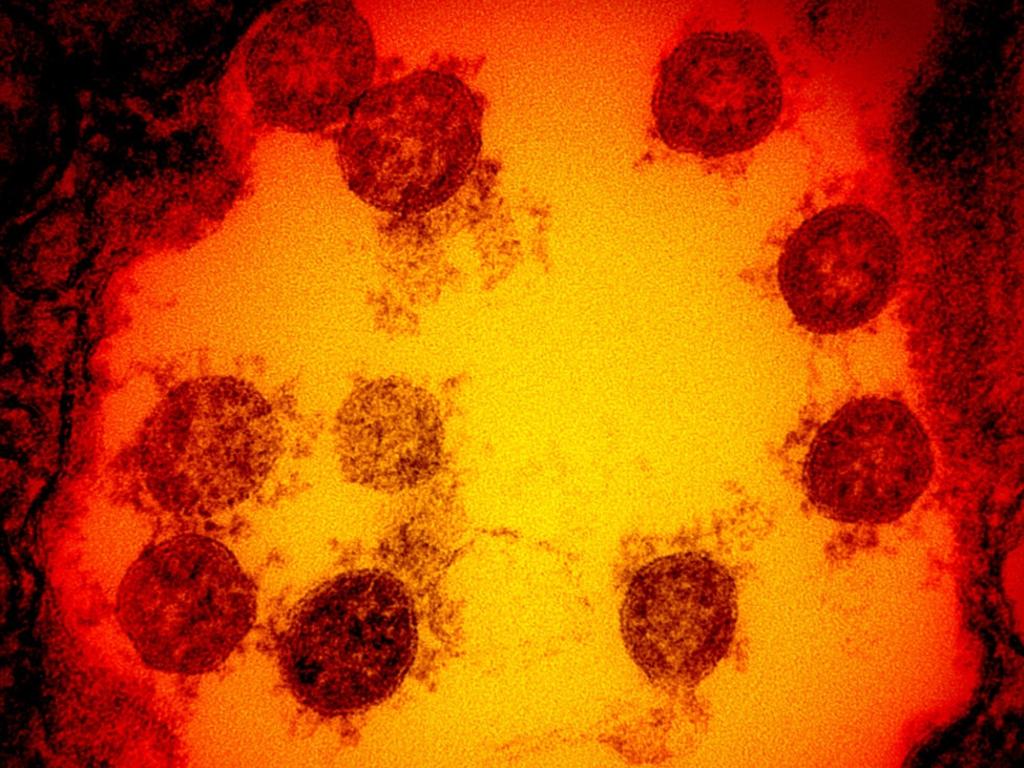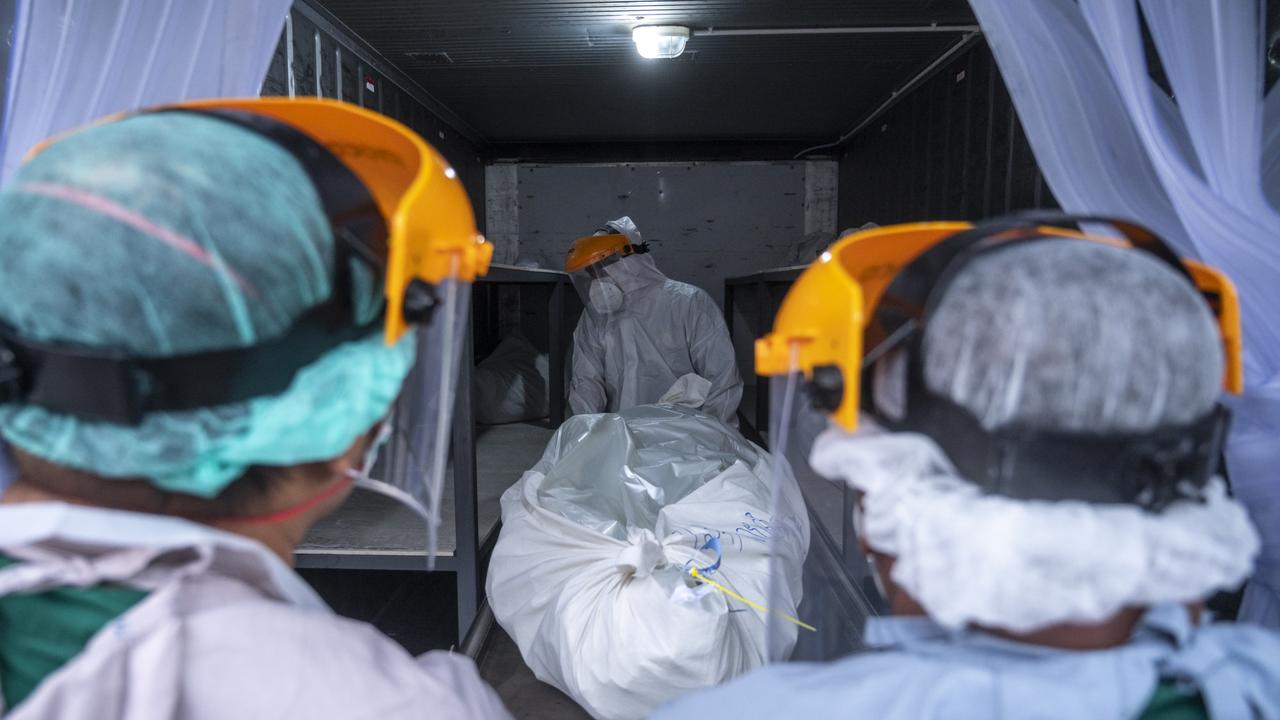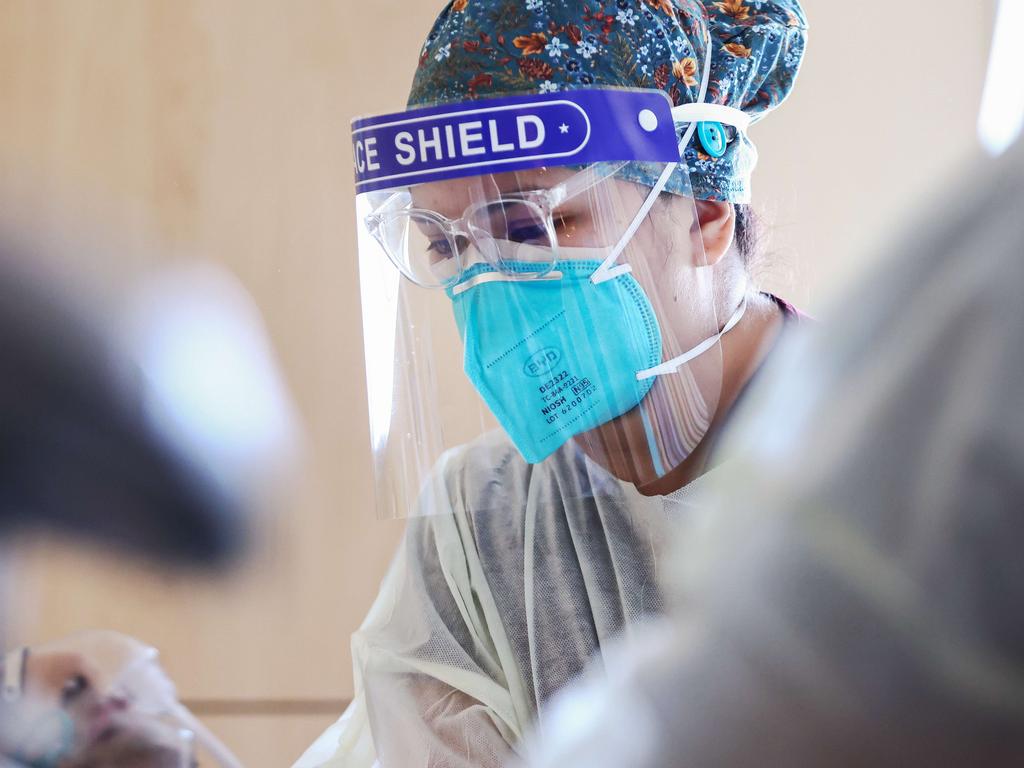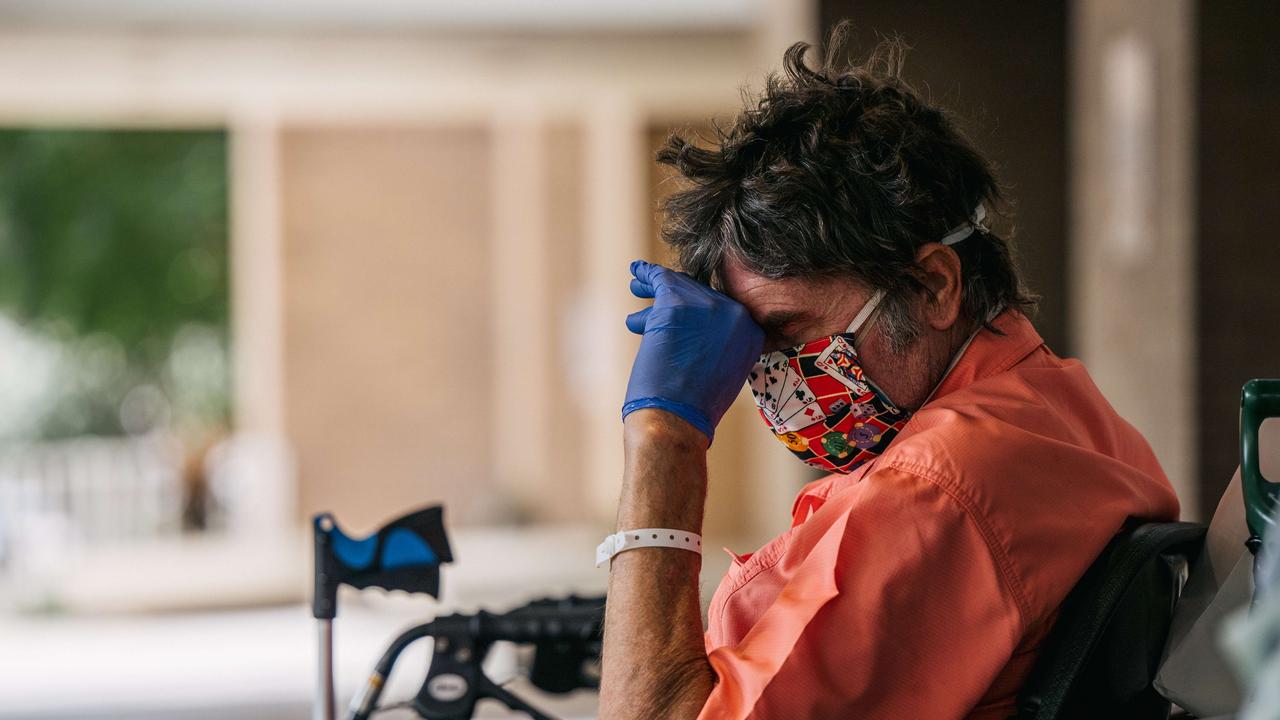Covid-19 Delta variant is a warning to act before virus becomes more dangerous
Delta’s outpacing all other variants but virologists have dissected its attributes – and they’ve found it can get much more powerful yet.
Delta is a winner. In the viral race to reproduce, it’s outpacing all comers. But virologists have dissected its attributes. And they’ve found it can get much more powerful yet.
At the moment, it’s just a simulation.
It takes everything we know about Covid-19’s ability to invade human cells. It breaks this down into its building blocks. It then tests every possible recombination to see what they can do.
The outcome is a ‘Covid Ultimate’.
“Delta is a warning — it’s a warning that the virus is evolving, but it is also a call to action that we need to move now before more dangerous variants emerge,” says World Health Organisation director of emergencies Michael Ryan.
“The virus has got fitter. The virus has got faster. The game plan still works, but we need to implement and execute our game plan much more efficiently and much more effectively than we’ve ever done before.”
RELATED: New strain scarier than Delta

Delta is already sending twice as many people to hospital and into intensive care wards.
But a potential mutation of the virus is 600 times better at breaking into human cells.
“We have safe ways of getting a glimpse into the future of what this virus can become,” says Kirby Institute associate professor Dr Stuart Turville. “There are some good studies out there that have looked at a kind of sped-up evolution”.
This isn’t a prophecy. It’s a possibility.
For it to eventuate would be the equivalent of a 30,000 ball lottery rolling a specific set of seven numbers.
But evolution can give those balls a guiding nudge. And they’ve already been brought together in the laboratory. The virus it produces is nasty. It’s one that infects with much greater ease. It’s one that appears particularly deft at dodging our immune systems.
But, Dr Turville says, viruses can’t be winners in all conditions. They optimise themselves for the situations they face. And vaccines are the best way of tilting the playing field against them.
Apex predator
“Delta’s doing a couple of things that are different,” Dr Turville says.
“But be careful of some of the numbers being bandied about. They’re from preprint studies and not fully checked yet. I don’t think Delta’s a thousand times stronger than before. But it’s certainly a more efficient virus. And that efficiency means viral loads in patients grow quicker.”
What is certain is that Covid-19 is the most intensely studied virus in history.
HIV may be better understood. But it hasn’t had as much attention at any one time.
“We’re getting a better feel for what this Delta variant is doing,” Dr Turville says.
The outside of a virus is covered in spike proteins. These are like grappling arms with different shaped hooks attached. Delta’s hooks are proving sharper than before.
And once a cell is snared, the spike protein’ arm’ fuses the virus with the cell. In the case of Delta, this ‘arm’ is also faster and stronger.
“What we’re understanding is that there is a new spike that makes it ‘sticker’ to host cells,” he says. “This then ‘melts’ into the outside of that cell far more efficiently.”
At the moment, Delta is by far the most potent Covid-19 mutation.
“The question is still out there whether or not the virus can evolve to a point where it remains as fit as Delta – producing severe disease and death – in a vaccinated population,” he says. “It’s still early days.”
One thing’s for sure, though, he says — the fight’s far from over yet.
An ‘ultimate’ Covid?
Several recent studies have attempted to extrapolate where Covid-19 is headed.
One in particular, by Gideon Schreiber in Israel, has attracted Dr Turville’s attention. It zeroes in on the makeup of Covid-19’s spike ‘hook’. It broke that binding receptor down into its component building blocks and then calculated all their possible combinations.
Then Schreiber sifted through these for ones that did something.
“Curiously, he could predict the changes that emerged in the current variants of concern, ones we see in the real world,” Dr Turville says.
But one potential ‘hook’ mutation stands out from the rest. It makes Covid-19 some 600 times more capable of snaring a victim cell than the original strain.
“We’ve done an experiment where we’ve looked at the full virus spike protein with that particular receptor binding,” says Dr Turville. “To cut a long story short, yes, it transmits much better than Delta.”
RELATED: Scary Delta warning for younger Aussies

But such an ‘ultimate’ mutation isn’t here. It isn’t even close. Yet.
“That receptive binding domain has seven changes over the original virus we saw in early 2020,” he says. “Some variants of concern have some of these changes. But we’ve yet to see all seven locked in”.
What the research does, however, is alert the world’s Covid-19 testing facilities for the types of mutations to keep alert for. Every test in Australia is sequenced to help with contact tracing. And that sequencing provides a window into where Covid-19’s evolution is at.
“That future virus – if it does turn up – does have the capacity to infect better and also evade immune responses,” Dr Turville says.
“But the virus may never get to that point. It may evolve down another route. It may lock in other changes that get it to a similar point in a different way. We just don’t know. And we’ve been wrong before. I would never have predicted Delta!”
Evolutionary pressures
“The stronger the immune response, the more a virus is forced to evolve in ways it won’t like,” says Dr Turville. “That’s where the trade-off comes in.”
A virus needs to adapt to deceive immune systems. And that often involves sacrificing effective – but more obvious – ways of grappling host cells. Which is why vaccination is so effective. It presents the virus with a complex web of obstacles.
But the natural antibodies generated by simply getting sick with the disease aren’t so dense.
“Vaccine immunity is different to convalescent immunity,” Dr Turville says.
Put simply, your body doesn’t learn as much from getting sick as it does from a vaccine.
“A virus doesn’t need to change much to break through a convalescent’s immune system. We can see that with Beta now. But Covid-19 has to change a lot more to overcome Pfizer and Moderna. And we see AstraZeneca doing well against Delta.”
RELATED: ‘Nowhere near over’ as Delta’s grip tightens

But vaccines have to be done right.
A new study published by Scientific Reports models the chances of a vaccine-resistant strain emerging in the near future. It warns a “danger zone” is when populations have reached a vaccination level of about 60 per cent. This is where the balance between resistance and growth suits the success of resistant mutations.
Delta’s high transmission makes this even more likely — the more virus circulating means more partially and fully vaccinated people will be infected. And that means more chances of vaccine resistance developing.
Variants of concern
“To be honest, I think Delta is doing a perfectly good job with its current genetic makeup,” Dr Turville says.
The emerging Delta Plus variant in Brazil, he believes, doesn’t add sufficient advantage to elbow out its parent. “In other viruses where this mutation has turned up, it hasn’t made a huge difference. If it gives it an advantage, it’s only going to be a minor increment. The big gears of transmission are already in Delta.”
But that doesn’t mean Delta won’t evolve.
“There will probably be a version of Delta that accumulates other changes that will maybe help it get around antibody and vaccine responses. This will probably involve trade-offs for transmission. But I could be wrong.”
The Lambda variant, he says, is “very interesting”. It has two of Delta’s most successful mutations. But Delta has three.
“In a head-to-head fight between Delta and Lambda, I would say Delta will win as it has a third gear that Lambda doesn’t. And that’s the ‘melting’ advantage. So while Lambda is very ‘sticky’, it doesn’t have Delta’s ‘melting’ advantage.”

But we won’t know for sure until Delta and Lambda start competing for hosts in the Andes.
“I would say Delta will get into those areas in the next month or so. Then we’ll see.”
It’s a similar story for brand new variants such as B.1.621.
“It’s only how they succeed in the real world that alerts us as to how strong they are.”
Crystal-ball gazing
“HIV changes four times more often than coronavirus. Influenza, two times more often,” Dr Turville says.
The ultimate Covid-19 spike protein needs seven changes to be brought together at the same time.
“In a little over a year, we’re looking at a little over 20 changes in Covid-19’s 30,000 building blocks,” he says.
“These are the ones that have stuck with it because they’re beneficial. But there would have been a lot of other experiments the virus has made with its progeny that have gone nowhere, or they’re not as fit as others.”
Delta’s a perfect example.
“It’s taken over from Alpha in the UK. It’s taking over Beta in South Africa. And probably over the next few months, it will take over others like Gamma in Brazil.”
But success can be its own enemy.
It is left with no competitors. So the motivation for improvement can fall by the wayside.
“Kappa and Delta are very, very similar,” says Dr Turville.
“But Kappa has more immune evasion than Delta. It has a few changes that make it evade antibodies better than Delta. Delta, however, has changes that give it much greater strength when it comes to transmission. So it’s simply outgrowing Kappa.”
But nature needs equilibrium. Balance.
A virus that is too infectious, too deadly and too resistant will burn itself out. All its hosts will die, leaving it nowhere to go.
Instead, says Dr Turville, the most likely outcome is that Covid-19 will mutate in the face of vaccination opposition to become less deadly and infectious. “The spike will need to change to fool our immune systems,” he says.
“That may reduce its ability to ‘stick’ to and ‘melt’ with our cells.”
Jamie Seidel is a freelance writer | @JamieSeidel




